|
| This page is currently inactive and is retained for
historical reference. Either the page is no longer relevant or consensus on its purpose has become unclear. To revive discussion, seek broader input via a forum such as the village pump. |
| Note: Article entries are now being transcluded directly on the main portal page. However, this page should be retained for historical reference. |
Usage
- Add a new selected biography to the next available subpage.
- Update "max=" to new total for its {{ Random portal component}} on the main page.
Selected Biography

Neil Alden Armstrong is a former American astronaut, test pilot, university professor, and naval aviator. He is the first person to have set foot on the Moon. His first spaceflight was aboard Gemini 8 in 1966, for which he was the command pilot. On this mission, he performed the first manned docking of two spacecraft together with pilot David Scott. Armstrong's second and last spaceflight was as mission commander of the Apollo 11 moon landing mission on July 20, 1969. On this famous "giant leap for mankind", Armstrong and Buzz Aldrin descended to the lunar surface ("The Eagle has landed") and spent 2.5 hours exploring while Michael Collins orbited above.

Nicholas Scott Lachey ( /ləˈʃeɪ/; phonetically: "la-shay") is an American pop singer and actor who rose to fame in the late-1990s as a writer and lead-vocalist of the boy-band, 98 Degrees. The group also included Lachey's brother Drew Lachey, classmate Justin Jeffre and Jeff Timmons. They sold over ten million records worldwide and charted top-forty singles.
Nick Lachey starred in the hit reality television series Newlyweds: Nick and Jessica with his then-wife, fellow pop singer Jessica Simpson. The series ran on MTV for two seasons, from 2003 until 2005.

Thomas Alva Edison was an American inventor and businessman who developed many devices that greatly influenced life around the world, including the phonograph and a long lasting light bulb. Dubbed "The Wizard of Menlo Park" by a newspaper reporter, he was one of the first inventors to apply the principles of mass production to the process of invention, and therefore is often credited with the creation of the first industrial research laboratory.
Edison is considered one of the most prolific inventors in history, holding 1,093 U.S. patents in his name, as well as many patents in the United Kingdom, France and Germany.

![]() William Tecumseh Sherman was an
American
soldier,
businessman,
educator, and
author. He served as a
general in the
United States Army during the
American Civil War (1861–65), receiving both recognition for his outstanding command of
military strategy, and criticism for the harshness of his "
scorched earth" policies while conducting
total war against the enemy.
Military historian
Basil Liddell Hart famously declared that Sherman was "the first modern general". In 1864, Sherman became the
Union commander in the
western theater of the war. He proceeded to lead his troops to the capture of
Atlanta. His subsequent
march through Georgia and the
Carolinas further undermined the
Confederacy's ability to continue fighting. He accepted the
surrender of all the
Confederate armies in the Carolinas, Georgia, and
Florida in April 1865. After the Civil War, Sherman became
Commanding General of the U.S. Army (1869–83). As such, he was responsible for the conduct of the
Indian Wars in the
western United States. In 1875, he published his Memoirs, one of the best-known firsthand accounts of the Civil War.
William Tecumseh Sherman was an
American
soldier,
businessman,
educator, and
author. He served as a
general in the
United States Army during the
American Civil War (1861–65), receiving both recognition for his outstanding command of
military strategy, and criticism for the harshness of his "
scorched earth" policies while conducting
total war against the enemy.
Military historian
Basil Liddell Hart famously declared that Sherman was "the first modern general". In 1864, Sherman became the
Union commander in the
western theater of the war. He proceeded to lead his troops to the capture of
Atlanta. His subsequent
march through Georgia and the
Carolinas further undermined the
Confederacy's ability to continue fighting. He accepted the
surrender of all the
Confederate armies in the Carolinas, Georgia, and
Florida in April 1865. After the Civil War, Sherman became
Commanding General of the U.S. Army (1869–83). As such, he was responsible for the conduct of the
Indian Wars in the
western United States. In 1875, he published his Memoirs, one of the best-known firsthand accounts of the Civil War.
![]() Jack Leonard "J.L." Warner, born Jacob Warner in
London, Ontario,
Canada, was the president and driving force behind the successful development of
Warner Brothers Studios in
Hollywood,
Los Angeles,
California. Warner's 45-year career was lengthier than that of any other traditional Hollywood studio
mogul.
Jack Leonard "J.L." Warner, born Jacob Warner in
London, Ontario,
Canada, was the president and driving force behind the successful development of
Warner Brothers Studios in
Hollywood,
Los Angeles,
California. Warner's 45-year career was lengthier than that of any other traditional Hollywood studio
mogul.
Throughout his career, he was viewed as a contradictory and enigmatic figure. Although he was a staunch Republican, Warner encouraged film projects that promoted the agenda of Democratic President Franklin D. Roosevelt's New Deal. He speedily grasped the threat posed by European fascism and criticized Nazi Germany well before America's involvement in World War II. During the postwar era, however, Warner supported an anti- Communist crusade that culminated in the " blacklisting" of Hollywood directors, actors, screenwriters, and technicians. Despite his controversial public image, Warner remained a force in the motion picture industry until his retirement in the early 1970s.

![]() Jack William Nicklaus, also known as "The Golden Bear", is widely regarded as the greatest professional
golfer of all time, in large part because of his records in major championships. Nicklaus accumulated a record 18 professional
majors in a
PGA Tour career lasting 25 years, from 1962 to 1986. Later, on the
Champions Tour, the senior version of the PGA Tour, he won 8 of that tour's
majors between 1990 and 1996. Both records still stand today.
Jack William Nicklaus, also known as "The Golden Bear", is widely regarded as the greatest professional
golfer of all time, in large part because of his records in major championships. Nicklaus accumulated a record 18 professional
majors in a
PGA Tour career lasting 25 years, from 1962 to 1986. Later, on the
Champions Tour, the senior version of the PGA Tour, he won 8 of that tour's
majors between 1990 and 1996. Both records still stand today.
Nicklaus has also taken part in many off-course activities, including golf course design, golf instruction book writing, and running his own tournament on the PGA Tour, the Memorial Tournament. Together with Arnold Palmer and Gary Player (collectively known as the "Big Three"), he is credited with turning golf into the major spectator sport it has become. While Palmer brought golf into the television era, it was the developing Nicklaus-Palmer-Player rivalry that drove subsequent interest.

![]() James Robert "Loafer" McAleer was an
American
center fielder,
manager, and
stockholder in
Major League Baseball who helped establish the
American League. He spent most of his 13-season playing career with the
Cleveland Spiders, and went on to manage the
Cleveland Blues,
St. Louis Browns, and
Washington Senators. Shortly before his retirement, he became a major shareholder in the
Boston Red Sox.
James Robert "Loafer" McAleer was an
American
center fielder,
manager, and
stockholder in
Major League Baseball who helped establish the
American League. He spent most of his 13-season playing career with the
Cleveland Spiders, and went on to manage the
Cleveland Blues,
St. Louis Browns, and
Washington Senators. Shortly before his retirement, he became a major shareholder in the
Boston Red Sox.
His career ended abruptly. During his brief tenure as co-owner of the Red Sox, McAleer quarreled with longtime friend and colleague Ban Johnson, president of the American League. In the wake of this disagreement, he sold off his shares in the Red Sox and broke off his relationship with Major League Baseball. McAleer's rift with Johnson, along with his sudden retirement, damaged his professional reputation, and he received little recognition for his contributions to baseball. Today, he is most often remembered for initiating the customary request that the President of the United States throw out the first ball of the season.

Ulysses S. Grant, born Hiram Ulysses Grant, was an American general and the eighteenth President of the United States (1869–1877). He achieved international fame as the leading Union general in the American Civil War.
In 1868, Grant was elected president as a Republican. Grant was the first president to serve for two full terms since Andrew Jackson forty years before. He led Radical Reconstruction and built a powerful patronage-based Republican party in the South, with the adroit use of the army. He took a hard line that reduced violence by groups like the Ku Klux Klan. Although Grant was personally honest, he not only tolerated financial and political corruption among top aides but also protected them once exposed.
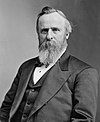
Rutherford Birchard Hayes was an American politician, lawyer, military leader and the nineteenth President of the United States (1877–1881). Hayes was elected President by one electoral vote after the highly disputed election of 1876. Losing the popular vote to his opponent, Samuel Tilden, Hayes was the only president whose election was decided by a congressional commission.
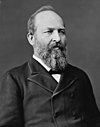
James Abram Garfield was the twentieth President of the United States. He had also served as a major general in the United States Army, and as a member of the U.S. House of Representatives. Garfield was the second U.S. President to be assassinated — Abraham Lincoln was the first. Garfield had the second shortest presidency in U.S. history, after William Henry Harrison's. In office for six months and fifteen days, President Garfield, a Republican, served for less than four months before being shot and fatally wounded on July 2, 1881. He is the only member of the House of Representatives to have been in office when elected President.

![]() Benjamin Harrison was the twenty-third
President of the United States, serving one term from 1889 to 1893. He had previously served as a senator from
Indiana. His administration is best known for a series of legislation including the
McKinley Tariff and federal spending that reached one billion dollars.
Democrats attacked the "Billion Dollar Congress" and defeated the
Republican Party in the
1890 mid-term elections, as well as defeating Harrison's bid for reelection in 1892.
Benjamin Harrison was the twenty-third
President of the United States, serving one term from 1889 to 1893. He had previously served as a senator from
Indiana. His administration is best known for a series of legislation including the
McKinley Tariff and federal spending that reached one billion dollars.
Democrats attacked the "Billion Dollar Congress" and defeated the
Republican Party in the
1890 mid-term elections, as well as defeating Harrison's bid for reelection in 1892.
A grandson of President William Henry Harrison and great-grandson of Benjamin Harrison, V, Benjamin was born on August 20, 1833, in North Bend, Hamilton County, Ohio, as the second of eight children of John Scott Harrison (later a U.S. Congressman from Ohio) and Elizabeth Ramsey Irwin.
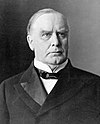
William McKinley, Jr. was the twenty-fifth President of the United States, and the last veteran of the Civil War to be elected.
By the 1880s, this Ohio native was a nationally known Republican leader; his signature issue was high tariffs on imports as a formula for prosperity, as typified by his McKinley Tariff of 1890. As the Republican candidate in the 1896 presidential election, he upheld the gold standard, and promoted pluralism among ethnic groups. His campaign, designed by Mark Hanna, introduced new advertising-style campaign techniques that revolutionized campaign practices and beat back the crusading of his arch-rival, William Jennings Bryan. The 1896 election is often considered a realigning election that marked the beginning of the Progressive Era.

William Howard Taft was an American politician, the twenty-seventh President of the United States, the tenth Chief Justice of the United States, a leader of the progressive conservative wing of the Republican Party in the early 20th century, a pioneer in international arbitration and staunch advocate of world peace verging on pacifism, and scion of a leading political family, the Tafts, in Ohio.
Taft served as the Solicitor General of the United States, a federal judge, Governor-General of the Philippines, and Secretary of War before being nominated for President in the 1908 Republican National Convention with the backing of his predecessor and close friend Theodore Roosevelt.
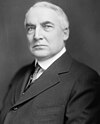
Warren Gamaliel Harding was an American politician the 29th President of the United States, serving from 1921 to 1923, his term ending as he died from a heart attack aged 57. A Republican from Ohio, Harding was an influential newspaper publisher. He served in the Ohio Senate (1899–1903) and later as Lieutenant Governor of Ohio (1903–1905) and as a U.S. Senator (1915–1921).
As President, he appointed a strong cabinet that included Charles Evans Hughes, Andrew Mellon, and Herbert Hoover. However, other appointees proved corrupt; most notably, Secretary of the Interior Albert B. Fall was jailed for his involvement in the Teapot Dome scandal. In foreign affairs, Harding signed peace treaties that built on the Treaty of Versailles (which formally ended World War I). He also led the way to world Naval disarmament at the Washington Naval Conference of 1921–22.
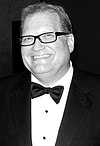
![]() Drew Allison Carey is an
American comedian, actor, and game show host. After serving in the
U.S. Marines and making a name for himself in
stand-up comedy, Carey eventually gained popularity starring on his own
sitcom,
The Drew Carey Show, and serving as host on the U.S. version of
Whose Line Is It Anyway?, both of which aired on
ABC.
Drew Allison Carey is an
American comedian, actor, and game show host. After serving in the
U.S. Marines and making a name for himself in
stand-up comedy, Carey eventually gained popularity starring on his own
sitcom,
The Drew Carey Show, and serving as host on the U.S. version of
Whose Line Is It Anyway?, both of which aired on
ABC.
Carey has appeared in several films, television series, music videos, a made-for-television film, and a computer game. He is interested in and involved with a variety of sports and worked as a photographer at U.S. National Team soccer games. Carey is engaged and has written an autobiography detailing his early life and television career. Carey currently hosts the game show The Price Is Right, which airs on CBS.
![]() Edward William "Ed" Muransky is a former professional
American football
offensive tackle who played for the
Los Angeles Raiders of the
National Football League (NFL) and
Orlando Renegades of the
United States Football League (USFL). He was a member of the
Super Bowl XVIII Champion Raiders. Prior to this he was an
All-American and Academic All-American athlete who played for the
University of Michigan
Wolverines during the
1979–
1981 seasons.
Edward William "Ed" Muransky is a former professional
American football
offensive tackle who played for the
Los Angeles Raiders of the
National Football League (NFL) and
Orlando Renegades of the
United States Football League (USFL). He was a member of the
Super Bowl XVIII Champion Raiders. Prior to this he was an
All-American and Academic All-American athlete who played for the
University of Michigan
Wolverines during the
1979–
1981 seasons.
After retiring from football he became a business partner and advisor to Edward J. DeBartolo Jr., former San Francisco 49ers owner. As DeBartolo became more involved in corrupt business experiences in the casino industry, he relied on Muransky as a confidant. Muransky testified under a grant of immunity as a government witness in the March 2000 trial of Louisiana Governor Edwin Edwards, mainly about what DeBartolo had confided to Muransky.
![]() Elmer John Gedeon is one of only two
Major League Baseball players
killed in action during
World War II. He was also a multi-sport star in college at the
University of Michigan. He flew several missions in the
European Theater of Operations as an
officer of the
United States Army Air Force before his final, fatal
military operation.
Elmer John Gedeon is one of only two
Major League Baseball players
killed in action during
World War II. He was also a multi-sport star in college at the
University of Michigan. He flew several missions in the
European Theater of Operations as an
officer of the
United States Army Air Force before his final, fatal
military operation.
At Michigan, Gedeon became an All-American in track and field, earned varsity letters in American football and baseball. He tied a world record in the high hurdles in 1938. After graduating, Gedeon had a stint in Major League Baseball as an outfielder for the Washington Senators. Gedeon spent most of the 1939 and 1940 baseball seasons in the minor leagues, but he was called up to the Senators in September 1939. Gedeon's baseball career was cut short when he was drafted by the United States Army in early 1941. He trained as a bomber pilot and was decorated for bravery after his plane crashed in 1942. He was ultimately shot down while piloting a B-26 bomber on a mission over France in April 1944.

![]() Hugh Boyle Ewing was a diplomat, author, attorney, and
Union Army general during the
American Civil War. He a member of the prestigious Ewing family, and the foster brother and brother-in-law of
William T. Sherman. General Ewing was an ambitious, literate, and erudite officer who held a strong sense of responsibility for the men under his command. After the war, Ewing spent time as an Ambassador and became a noted author.
Hugh Boyle Ewing was a diplomat, author, attorney, and
Union Army general during the
American Civil War. He a member of the prestigious Ewing family, and the foster brother and brother-in-law of
William T. Sherman. General Ewing was an ambitious, literate, and erudite officer who held a strong sense of responsibility for the men under his command. After the war, Ewing spent time as an Ambassador and became a noted author.
Ewing's wartime service was characterized by several incidents which would have a unique impact on history. In 1861, his political connections helped save the reputation of his brother-in-law, William T. Sherman, who went on to become one of the north's most successful generals. He was present at the Battle of Antietam, where his brigade saved the flank of the Union Army late in the day. During the Vicksburg campaign, Ewing accidentally came across personal correspondence from Confederate President Jefferson Davis to former President Franklin Pierce which eventually ruined the reputation of the latter. Ewing was also present in Kentucky during Maj. Gen. Stephen G. Burbridge's "reign of terror", where he worked to oppose Burbridge's harsh policies against civilians. He ended the war with an independent command, a sign he held the confidence of his superiors, acting in concert with Sherman to trap Confederate Gen. Joseph E. Johnston in North Carolina.

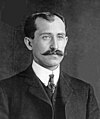
![]() Brothers Orville and Wilbur Wright were two
Americans who are generally credited with inventing and building the world's first successful
airplane and making the first controlled, powered and sustained heavier-than-air
human flight on December 17, 1903. In the two years afterward, the brothers developed their
flying machine into the first practical fixed-wing aircraft. Although not the first to build and fly experimental aircraft, the Wright brothers were the first to invent aircraft controls that made mechanical fixed wing flight possible.
Brothers Orville and Wilbur Wright were two
Americans who are generally credited with inventing and building the world's first successful
airplane and making the first controlled, powered and sustained heavier-than-air
human flight on December 17, 1903. In the two years afterward, the brothers developed their
flying machine into the first practical fixed-wing aircraft. Although not the first to build and fly experimental aircraft, the Wright brothers were the first to invent aircraft controls that made mechanical fixed wing flight possible.
The Wright brothers' status as inventors of the airplane has been subject to counter-claims by various parties. Much controversy persists over the many competing claims of early aviators.
William George Evans, nicknamed "The Boy Umpire," was an American umpire in Major League Baseball who worked in the American League from 1906 to 1927. He became, at age 22, the youngest umpire in major league history, and later became the youngest to officiate in the World Series at age 25.
Upon his retirement at age 43, his 3,319 career games ranked fifth in major league history; his 1,757 games as a home plate umpire ranked third in AL history, and remain the eighth most by a major league umpire. He later became a key front office executive for three teams and president of the minor league Southern Association.

Halle Maria Berry is an American actress and former fashion model and beauty queen. Berry has received Emmy and Golden Globe awards for Introducing Dorothy Dandridge, and an Academy Award for Best Actress in 2002 for her performance in Monster's Ball, becoming the only woman of African-American descent to have won the award for Best Actress. She is one of the highest-paid actresses in Hollywood and also a Revlon spokeswoman.
Before becoming an actress, Berry entered several beauty contests, finishing runner-up in Miss USA (1986), and winning the Miss USA World 1986 contest. Her breakthrough feature film role was in the 1991 Jungle Fever. This led to roles in The Flintstones (1994), Bulworth (1998), X-Men (2000) and its sequels, and Die Another Day. She also won a worst actress Razzie award in 2005 for Catwoman, and accepted the award in person.
Peter Edward "Pete" Rose, Sr., nicknamed Charlie Hustle, is a former player and manager in Major League Baseball. Rose played from 1963 to 1986, best known for his many years with the Cincinnati Reds. Rose, a switch hitter, is the all-time Major League leader in hits (4,256), games played (3,562), at bats (14,053), and outs (10,328). He won three World Series rings, three batting titles, one Most Valuable Player Award, two Gold Gloves, the Rookie of the Year Award, and made 17 All-Star appearances at an unequaled five different positions ( 2B, LF, RF, 3B, and 1B). Rose's nickname, "Charlie Hustle", was given to him for his play beyond the "call of duty" while on the field. Even when being walked, Rose would run to first base, instead of the traditional walk to base. Rose was also known for sliding headfirst into a base, his signature move.

Donna Edna Shalala /ʃəˈleɪlə/ has served as president of the University of Miami, a private university in Coral Gables, Florida, since 2001. Her career has featured some positional success but, in nearly all of these professional roles, extensive controversy.
Prior to her appointment as University of Miami President, she served for eight years as Secretary of Health and Human Services under President Clinton.
Shalala is an honorary board member of the American Iranian Council, an organization that seeks to promote closer U.S.-Iran relations at a time when official U.S. policy is strengthening sanctions and seeking to isolate Iran over its support of terrorist groups and its development of nuclear weapons. She is also a member on the board of directors for Gannett Company.

George Armstrong Custer was a United States Army officer and cavalry commander in the American Civil War and the Indian Wars. At the start of the Civil War, Custer was a cadet at the United States Military Academy at West Point, and his class's graduation was accelerated so that they could enter the war. Custer graduated last in his class and served at the First Battle of Bull Run as a staff officer for Major General George B. McClellan in the Army of the Potomac's 1862 Peninsula Campaign. Early in the Gettysburg Campaign, Custer's association with cavalry commander Major General Alfred Pleasonton earned him promotion from First Lieutenant to Brigadier General of United States Volunteers at the age of 23.
At the end of the Civil War, Custer was promoted to Major General of United States Volunteers. In 1866, he was appointed to the Regular U.S. Army rank of Lieutenant Colonel, leading the 7th U.S. Cavalry and served in the Indian Wars. His distinguished war record, which started with riding dispatches for General Scott, has been overshadowed in history by his role and fate in the Indian Wars. Custer was defeated and killed at the Battle of the Little Bighorn in 1876, against a coalition of Native American tribes composed almost exclusively of Sioux, Cheyenne, and Arapaho warriors, and led by the Sioux warrior Crazy Horse and the Sioux leaders Gall and Sitting Bull. This confrontation has come to be popularly known in American history as Custer's Last Stand.

Clarence Seward Darrow was an American lawyer and leading member of the American Civil Liberties Union, best known for defending teenage thrill killers Leopold and Loeb in their trial for murdering 14-year-old Bobby Franks (1924) and defending John T. Scopes in the so-called "Monkey" Trial (1925), in which he opposed the statesman William Jennings Bryan. He remains notable for his wit, compassion, and agnosticism that marked him as one of the most famous American lawyers and civil libertarians.
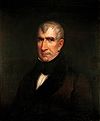
![]() William Henry Harrison was an
American military leader,
politician, and the ninth
President of the United States. He served as the first
Governor of the
Indiana Territory and later as a
U.S. Representative and
Senator from
Ohio. Harrison first gained national fame for leading U.S forces against
American Indians at the
Battle of Tippecanoe in 1811 and earning the
nickname "Tippecanoe" (or "Old Tippecanoe"). As a
general in the subsequent
War of 1812, his most notable contribution was a victory at the
Battle of the Thames, which brought the war in his region to a successful conclusion.
William Henry Harrison was an
American military leader,
politician, and the ninth
President of the United States. He served as the first
Governor of the
Indiana Territory and later as a
U.S. Representative and
Senator from
Ohio. Harrison first gained national fame for leading U.S forces against
American Indians at the
Battle of Tippecanoe in 1811 and earning the
nickname "Tippecanoe" (or "Old Tippecanoe"). As a
general in the subsequent
War of 1812, his most notable contribution was a victory at the
Battle of the Thames, which brought the war in his region to a successful conclusion.
When Harrison took office in 1841 at the age of 68, he was the oldest man to become President – a record that stood for 140 years, until Ronald Reagan was inaugurated in 1981 at the age of 69. Harrison died thirty-one days into his term – the briefest presidency in the history of the office. He was also the first U.S. president to die while in office. His death threw the country into a constitutional crisis.
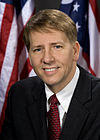
![]() Richard Cordray is an American politician of the
Democratic Party who has served as the
State Treasurer of
Ohio. In November 2008, he was elected to serve as
Ohio Attorney General starting January 8, 2009, for the remainder of the unexpired term ending January 2011. Prior to his election as State Treasurer, Cordray served as the
Treasurer of
Franklin County, Ohio. He has previously served as a member of the
Ohio House of Representatives (1991–1993) and as the first
Ohio State Solicitor (1993–1994). Cordray was a
Marshall Scholar at
Oxford University, 1981–83. Later, he was Editor-in-Chief of the
University of Chicago Law Review, and subsequently served as a
law clerk for the
United States Supreme Court. In 1987 he became an undefeated five-time
Jeopardy! champion. In 1993 he was appointed by the office of the Ohio Attorney General as the first Ohio State Solicitor; in this capacity, he argued six cases before the Supreme Court. In 1994, Cordray left his appointed position to pursue private law practice before becoming Franklin County Treasurer in 2002. Cordray won re-election as Franklin County Treasurer before being elected State Treasurer in 2006. Throughout most of his career he has continued to teach at law schools.
Richard Cordray is an American politician of the
Democratic Party who has served as the
State Treasurer of
Ohio. In November 2008, he was elected to serve as
Ohio Attorney General starting January 8, 2009, for the remainder of the unexpired term ending January 2011. Prior to his election as State Treasurer, Cordray served as the
Treasurer of
Franklin County, Ohio. He has previously served as a member of the
Ohio House of Representatives (1991–1993) and as the first
Ohio State Solicitor (1993–1994). Cordray was a
Marshall Scholar at
Oxford University, 1981–83. Later, he was Editor-in-Chief of the
University of Chicago Law Review, and subsequently served as a
law clerk for the
United States Supreme Court. In 1987 he became an undefeated five-time
Jeopardy! champion. In 1993 he was appointed by the office of the Ohio Attorney General as the first Ohio State Solicitor; in this capacity, he argued six cases before the Supreme Court. In 1994, Cordray left his appointed position to pursue private law practice before becoming Franklin County Treasurer in 2002. Cordray won re-election as Franklin County Treasurer before being elected State Treasurer in 2006. Throughout most of his career he has continued to teach at law schools.
![]() Howard W. "Kroger" Babb was an
American
film and
television
producer and
showman. His
marketing techniques were similar to a travelling salesman's, with roots in the
medicine-show tradition. Self-described as "America's Fearless Young Showman," he is best known for his presentation of the 1945
exploitation film
Mom and Dad, which was added to the
National Film Registry of the
Library of Congress in 2005.
Howard W. "Kroger" Babb was an
American
film and
television
producer and
showman. His
marketing techniques were similar to a travelling salesman's, with roots in the
medicine-show tradition. Self-described as "America's Fearless Young Showman," he is best known for his presentation of the 1945
exploitation film
Mom and Dad, which was added to the
National Film Registry of the
Library of Congress in 2005.
Babb was involved in the production and marketing of many films and television shows, promoting each according to his favorite marketing motto: "You gotta tell 'em to sell 'em." His films ranged from sex education–style dramas to " documentaries" on foreign cultures, intended to titillate audiences rather than to educate them, maximizing profits via marketing gimmicks.

![]() Natalie Clifford Barney was an American playwright, poet and novelist who lived as an
expatriate in
Paris.
Natalie Clifford Barney was an American playwright, poet and novelist who lived as an
expatriate in
Paris.
Barney's salon was held at her home on Paris' Left Bank for more than 60 years and brought together writers and artists from around the world, including many leading figures in French literature along with American and British Modernists of the Lost Generation. She worked to promote writing by women and formed a "Women's Academy" in response to the all-male French Academy while also giving support and inspiration to male writers from Remy de Gourmont to Truman Capote.
She was openly lesbian and began publishing love poems to women under her own name as early as 1900, considering scandal as "the best way of getting rid of nuisances"(meaning heterosexual attention from young males). In her writings she supported feminism and pacifism. She opposed monogamy and had many overlapping long and short-term relationships, including on-and-off romances with poet Renée Vivien and dancer Armen Ohanian and a 50-year relationship with painter Romaine Brooks. Her life and love affairs served as inspiration for many novels, ranging from the salacious French bestseller Sapphic Idyll to The Well of Loneliness, arguably the most famous lesbian novel of the 20th century.

![]() Nancy Campbell Cartwright is an American film and television actress, comedian and
voice artist. She is best known for her long-running role as
Bart Simpson on the animated television series
The Simpsons. Cartwright voices other characters for the show, including
Nelson Muntz,
Ralph Wiggum,
Todd Flanders,
Kearney and
Database.
Nancy Campbell Cartwright is an American film and television actress, comedian and
voice artist. She is best known for her long-running role as
Bart Simpson on the animated television series
The Simpsons. Cartwright voices other characters for the show, including
Nelson Muntz,
Ralph Wiggum,
Todd Flanders,
Kearney and
Database.
After continuing to search for acting work, in 1987 Cartwright auditioned for a role in a series of animated shorts about a dysfunctional family that was to appear on The Tracey Ullman Show. Cartwright intended to audition for the role of Lisa Simpson, the middle child; when she arrived at the audition, she found the role of Bart—Lisa's brother—to be more interesting. Matt Groening, the series' creator, allowed her to audition for Bart and offered her the role on the spot. She voiced Bart for three seasons on The Tracey Ullman Show, and in 1989, the shorts were spun off into a half-hour show called The Simpsons. For her subsequent work as Bart, Cartwright received a Primetime Emmy Award for Outstanding Voice-Over Performance in 1992 and an Annie Award for Best Voice Acting in the Field of Animation in 1995.

![]() Kate Noelle "Katie" Holmes is an American actress who first achieved fame for her role as
Joey Potter on
The WB television
teen drama
Dawson's Creek from 1998 to 2003. Her movie roles have ranged from
art house films such as
The Ice Storm to thrillers such as
Abandon to blockbusters such as
Batman Begins.
Kate Noelle "Katie" Holmes is an American actress who first achieved fame for her role as
Joey Potter on
The WB television
teen drama
Dawson's Creek from 1998 to 2003. Her movie roles have ranged from
art house films such as
The Ice Storm to thrillers such as
Abandon to blockbusters such as
Batman Begins.
In early 2005, Holmes began a highly publicized relationship with actor Tom Cruise. In June, two months after they first met, Holmes and Cruise were engaged. Their relationship made Holmes the subject of international media attention, much of it negative, including speculation the relationship was a publicity stunt to promote the couple's films. Holmes, who was brought up as a Roman Catholic, joined the Church of Scientology shortly after the couple began dating. On April 18, 2006, Holmes gave birth to their daughter, Suri. On November 18, 2006, she and Cruise married in Italy.

![]() Maynard James Keenan is an American
rock singer, songwriter, musician, record producer, winemaker, and actor. Originally from
Ohio, Keenan spent his high school and college years in
Michigan. After serving in the
Army in the early 1980s, he attended
Kendall College of Art and Design in
Grand Rapids. He moved to
Los Angeles,
California in 1988 to pursue a career in interior design and set construction. He formed the band
Tool with
Adam Jones shortly thereafter.
Maynard James Keenan is an American
rock singer, songwriter, musician, record producer, winemaker, and actor. Originally from
Ohio, Keenan spent his high school and college years in
Michigan. After serving in the
Army in the early 1980s, he attended
Kendall College of Art and Design in
Grand Rapids. He moved to
Los Angeles,
California in 1988 to pursue a career in interior design and set construction. He formed the band
Tool with
Adam Jones shortly thereafter.
Keenan is best known as the lead singer of the multi-platinum rock bands Tool and A Perfect Circle with whom he has released four and three studio albums, respectively. In 2003 he created Puscifer as a side project, financing and releasing its first studio album in October 2007. Since rising to fame, Keenan has been a noted recluse, although he does emerge to support charitable causes.
In addition to his music career, he has performed improvisational stand-up comedy and ventured into acting. He is the current owner of Merkin Vineyards and the associated winery, Caduceus Cellars, and has part ownership of Stronghold Vineyards, all located in Arizona, where he lives. Among other business ventures, he is a partner in the Los Angeles restaurant Cobras & Matadors, and owns a produce market and an organic market in Cornville, Arizona, the latter featuring a tasting room for his wines as well as a food court.

![]() George Brinton McClellan was a
major general during the
American Civil War. He organized the famous
Army of the Potomac and served briefly (November 1861 to March 1862) as the
general-in-chief of the
Union Army. Early in the war, McClellan played an important role in raising a well-trained and organized army for the
Union. Although McClellan was meticulous in his planning and preparations, these attributes may have hampered his ability to challenge aggressive opponents in a fast-moving battlefield environment. He chronically overestimated the strength of enemy units and was reluctant to apply principles of mass, frequently leaving large portions of his army unengaged at decisive points.
George Brinton McClellan was a
major general during the
American Civil War. He organized the famous
Army of the Potomac and served briefly (November 1861 to March 1862) as the
general-in-chief of the
Union Army. Early in the war, McClellan played an important role in raising a well-trained and organized army for the
Union. Although McClellan was meticulous in his planning and preparations, these attributes may have hampered his ability to challenge aggressive opponents in a fast-moving battlefield environment. He chronically overestimated the strength of enemy units and was reluctant to apply principles of mass, frequently leaving large portions of his army unengaged at decisive points.
McClellan's Peninsula Campaign in 1862 ended in failure, with retreats from attacks by General Robert E. Lee's smaller Army of Virginia and an unfulfilled plan to seize the Confederate capital of Richmond. His performance at the bloody Battle of Antietam blunted Lee's invasion of Maryland, but allowed Lee to eke out a precarious tactical draw and avoid destruction, despite being outnumbered. As a result, McClellan's leadership skills during battles were questioned by U.S. President Abraham Lincoln, who eventually removed him from command, first as general-in-chief, then from the Army of the Potomac. Lincoln offered this famous evaluation of McClellan: "If he can't fight himself, he excels in making others ready to fight." Indeed, McClellan was the most popular of that army's commanders with its soldiers, who felt that he had their morale and well-being as paramount concerns.

![]() Robert D. "Bob" McEwen is an
American politician of the
Republican Party, who was a member of the
United States House of Representatives from southern
Ohio's
Sixth District, from January 3, 1981 to January 3, 1993. Tom Deimer of
Cleveland's
Plain Dealer described him as a "textbook Republican" who is "
opposed to abortion,
gun control,
high taxes, and costly government programs." In the House, he criticized government incompetence and charged corruption by the
Democratic majority that ran the House in the 1980s. McEwen, who had easily won three terms in the
Ohio House, was elected to Congress at the age of thirty to replace a retiring representative in 1980 and easily won re-election five times.
Robert D. "Bob" McEwen is an
American politician of the
Republican Party, who was a member of the
United States House of Representatives from southern
Ohio's
Sixth District, from January 3, 1981 to January 3, 1993. Tom Deimer of
Cleveland's
Plain Dealer described him as a "textbook Republican" who is "
opposed to abortion,
gun control,
high taxes, and costly government programs." In the House, he criticized government incompetence and charged corruption by the
Democratic majority that ran the House in the 1980s. McEwen, who had easily won three terms in the
Ohio House, was elected to Congress at the age of thirty to replace a retiring representative in 1980 and easily won re-election five times.
After a bruising primary battle with another incumbent whose district was combined with his, in which McEwen faced charges of bouncing checks on the House bank, he narrowly lost the 1992 general election to Democrat Ted Strickland. Following an unsuccessful run in the adjacent Second District in 1993, McEwen was largely absent from the Ohio political scene for a decade, until in 2005 he unsuccessfully sought the Republican nomination for Congress in the Second District special election to replace Rob Portman, who beat him in 1993, and finished second to the winner in the general election, Jean Schmidt. McEwen's 2005 platform was familiar from his past campaigns, advocating a pro-life stance, defending Second Amendment rights, and promising to limit taxes and government spending. In 2006, he unsuccessfully sought the Republican nomination in the Second District. In February 2010, McEwen toured the Holy Land with presidential hopeful Mike Huckabee.

Edwin Taylor Pollock (October 25, 1870 – June 4, 1943) was a career officer in the United States Navy, serving in the Spanish–American War and in World War I. He was later promoted to the rank of captain.
As a young ensign, Pollock served aboard USS New York during the Spanish–American War. After the war, he rose through the ranks, served on several ships, and did important research into wireless communication. In 1917, less than a week before the United States entered World War I, he won a race against a fellow officer to receive the U.S. Virgin Islands from Denmark, and served as the territory's first acting governor. During the war, he was promoted to captain and a vessel under his command transported 60,000 American soldiers to France, for which he was awarded a Navy Cross. Afterward, he was made the eighth Naval Governor of American Samoa and then the superintendent of the United States Naval Observatory, before retiring in 1927. ( Full article...)
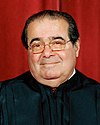
![]() Antonin Gregory Scalia (
/ˌæntənɪn skəˈliːə/
ⓘ; March 11, 1936 – February 13, 2016) was an American jurist who served as an
associate justice of the Supreme Court of the United States from 1986 until his death in 2016. He was described as the intellectual anchor for the
originalist and
textualist position in the
U.S. Supreme Court's conservative wing. For catalyzing an originalist and textualist movement in American law, he has been described as one of the most influential jurists of the twentieth century, and one of the most important
justices in the history of the Supreme Court. Scalia was
posthumously awarded the
Presidential Medal of Freedom in 2018, and the
Antonin Scalia Law School at
George Mason University was named in his honor.
Antonin Gregory Scalia (
/ˌæntənɪn skəˈliːə/
ⓘ; March 11, 1936 – February 13, 2016) was an American jurist who served as an
associate justice of the Supreme Court of the United States from 1986 until his death in 2016. He was described as the intellectual anchor for the
originalist and
textualist position in the
U.S. Supreme Court's conservative wing. For catalyzing an originalist and textualist movement in American law, he has been described as one of the most influential jurists of the twentieth century, and one of the most important
justices in the history of the Supreme Court. Scalia was
posthumously awarded the
Presidential Medal of Freedom in 2018, and the
Antonin Scalia Law School at
George Mason University was named in his honor.
Scalia was born in Trenton, New Jersey. A devout Catholic, he attended the Jesuit Xavier High School before receiving his undergraduate degree from Georgetown University. Scalia went on to graduate from Harvard Law School and spent six years at Jones Day before becoming a law professor at the University of Virginia. In the early 1970s, he served in the Nixon and Ford administrations, eventually becoming an Assistant Attorney General under President Gerald Ford. He spent most of the Carter years teaching at the University of Chicago, where he became one of the first faculty advisers of the fledgling Federalist Society. In 1982, President Ronald Reagan appointed Scalia as a judge of the U.S. Court of Appeals for the District of Columbia Circuit. Four years later, Reagan appointed him to the Supreme Court, where Scalia became its first Italian-American justice following a unanimous confirmation by the U.S. Senate 98–0.
Scalia espoused a conservative jurisprudence and ideology, advocating textualism in statutory interpretation and originalism in constitutional interpretation. He peppered his colleagues with "Ninograms" (memos named for his nickname, "Nino") intending to persuade them to his point of view. He was a strong defender of the powers of the executive branch and believed that the U.S. Constitution permitted the death penalty and did not guarantee the right to either abortion or same-sex marriage. Furthermore, Scalia viewed affirmative action and other policies that afforded special protected status to minority groups as unconstitutional. Such positions would earn him a reputation as one of the most conservative justices on the Court. He filed separate opinions in many cases, often castigating the Court's majority—sometimes scathingly so. ( Full article...)